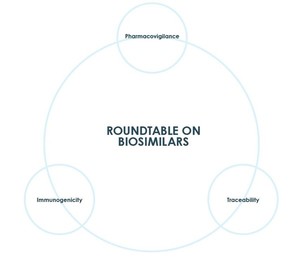Sandoz testimony at FDA hearing on biosimilars will emphasise need for consistent regulatory standards across all biologicals
Sandoz announced on 9 May 2012 that Dr Mark McCamish, Head of Global Biopharmaceutical Development, would present on behalf of the Novartis Group of companies (Novartis) at the 11 May 2012 FDA public hearing on draft guidances for biosimilars.
The message he will convey will focus on the need for a single science-based regulatory standard that FDA should apply across all biologicals, irrespective of the business model of the sponsor. As well as a single standard, Dr McCamish will address the points that biosimilar clinical studies should be only confirmatory and the fact that interchangeability is critical to maximising access to affordable biosimilars for US patients.
Source: Sandoz
Biotech majors warn FDA about threats to safety and innovation from biosimilars
Major players from the biological manufacturing arena including the Alliance for Safe Biologic Medicines, Amgen and Novo Nordisk have contacted FDA about fears concerning how biosimilars may affect patient safety and the innovative biologicals industry.
Amgen has told FDA the agency’s requirement in its draft guidances for biosimilars that biosimilarity be maintained over time risks inhibiting manufacturing improvements and places an undue burden on industry without benefiting patients. Novo Nordisk on the other hand is more concerned about the fact that FDA intends to allow alternative delivery devices for biosimilars. The Danish company has told FDA that this creates significant safety implications, citing the example of Eprex/Janssen (epotin alfa), an anaemia treatment that linked to increase cases in pure red cell aplasia after a formulation change in 1998, with likely cause of leachables from uncoated rubber stoppers in prefilled syringes.
Whilst the Alliance for Safe Biologic Medicines–an organisation which includes patients, physicians, innovative medical biotechnology companies and others–welcomed the progress FDA had made towards approving biosimilars, it has urged FDA to take a cautious approach when it comes to biosimilars to ensure patient safety.
Source: Alliance for Safe Biologic Medicines, in-Pharma Technologist
Biocon-Mylan partnership has US$33 billion biosimilar drug portfolio
More than two years after announcing a joint venture with US-based Mylan in 2009, India-based biotech company Biocon revealed that potential earnings of its biosimilar drugs under its deal with Mylan could be worth US$33 billion for biosimilars of drugs whose patents will expire by 2015.
The company intends its first launch to be for a biosimilar of Swiss pharma giant Roche’s breast cancer treatment Herceptin (trastuzumab). The biosimilar is currently undergoing a phase III clinical trial and is expected to be ready for launch in India by the end of 2013 or early 2014. The joint venture with Mylan also covers four other biosimilars adalimumab (Humira by Abbott), bevacizumab (Avastin by Roche), eternacept (Enbrel by Pfizer) and pegfilgrastim (Neulasta by Roche).
Source: Economic Times of India
Pfizer starts phase I/II biosimilar rituximab trial
Pfizer has started a phase I/II trial in patients with moderate to severe rheumatoid arthritis who are being treated with methotrexate comparing the company’s biosimilar candidate (PF-05280586) in terms of pharmacokinetics, pharmacodynamics and safety to Roche’s leading monoclonal antibody Rituxan/MabThera (rituximab). Started in March 2012, the REFLECTIONS B328-01 trial will be conducted in 210 patients in the US and is expected to finish in December 2013.
Rituximab is approved in the EU and US for treatment of lymphomas, autoimmune diseases and transplant rejection. The drug ranks among the top 10 biological drugs in Europe, with 2010 sales estimated to be around US$1.7 billion. Patents on rituximab expire in the US between 2015 and 2018 and in the rest of the world in 2013. With sales in the billions it is not surprising that, despite the fact that the patents on rituximab do not expire until 2015, manufacturers are already working on biosimilars. Companies that have disclosed clinical trials of biosimilar rituximab products include Celltrion, Merck, Sandoz and Teva.
Source: clinicaltrials.gov
G-CSF biosimilars show a cost advantage compared to reference products
Hadji et al. carried out a comparison of outpatient medication costs per patient and per treatment cycle for granulocyte colony-stimulating factors (G-CSFs) in Germany. The research evaluated G-CSF prescriptions between January 2008 and July 2010 and analysed prescription data from statutory health insurance members of 8,726 patients treated with originator filgrastim, 4,240 with biosimilar filgrastim, 6,456 with lenograstim and 9,939 with pegfilgrastim. The results of the study showed that compared to their reference product the biosimilars showed a cost advantage.
Source: Int J Clin Pharmacol Ther
Cipla reduces cancer drug prices by up to 76%
On 3 May 2012 Indian generics manufacturer Cipla announced that the company would be reducing the price of its cancer medications in India. The price reductions range from 59% to 76%, and include the much discussed liver and kidney cancer drug sorafenib, which will be reduced by 76%. Cipla sells sorafenib in India under the branded generic name Soranib despite ongoing patent litigation from Bayer.
Related articles
Bayer opposes sorafenib compulsory licence in India
PhRMA speaks out against compulsory licensing in India
TRIPS and access to essential medicines
India under attack
Source: Cipla








 0
0










Post your comment